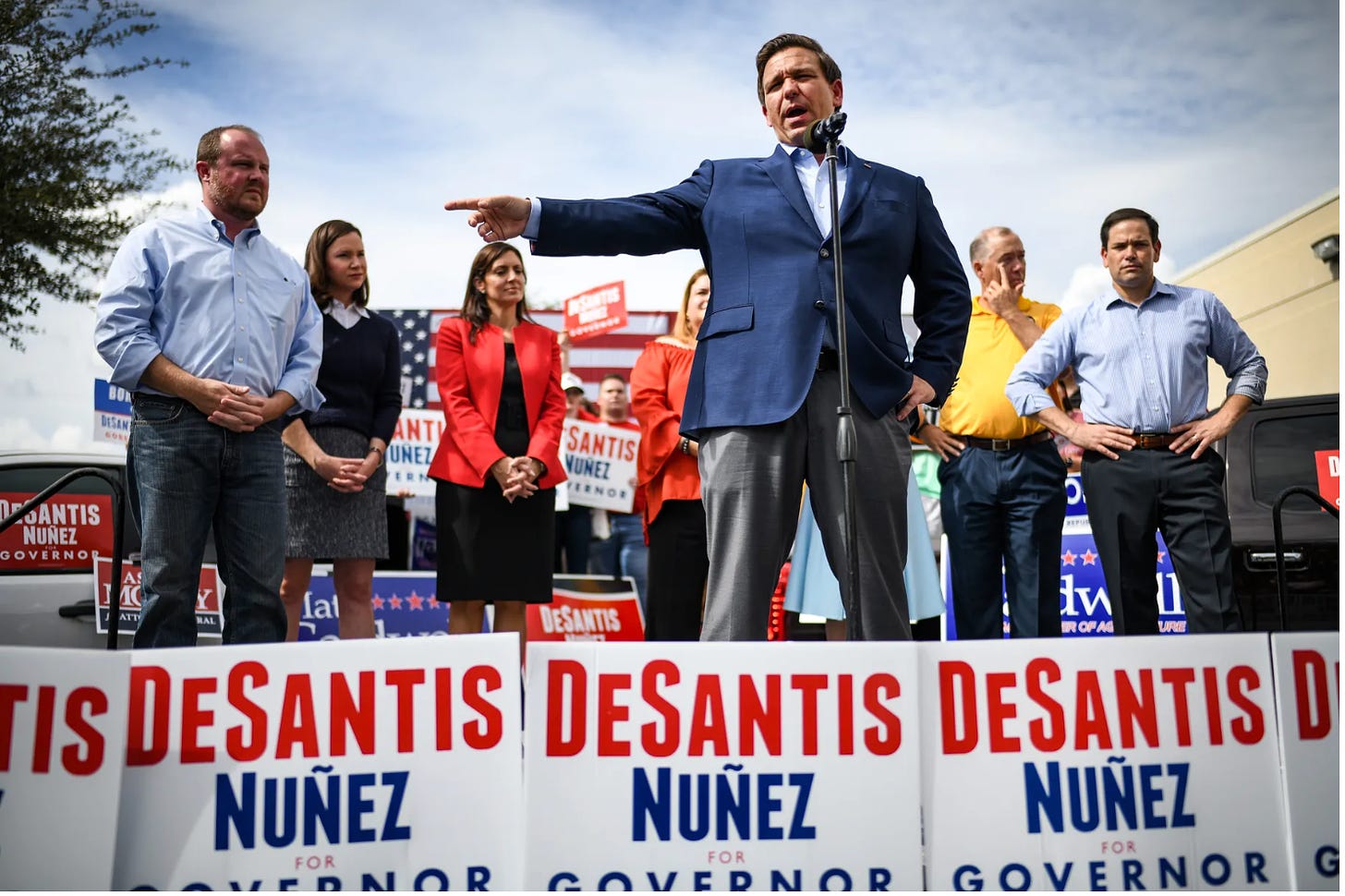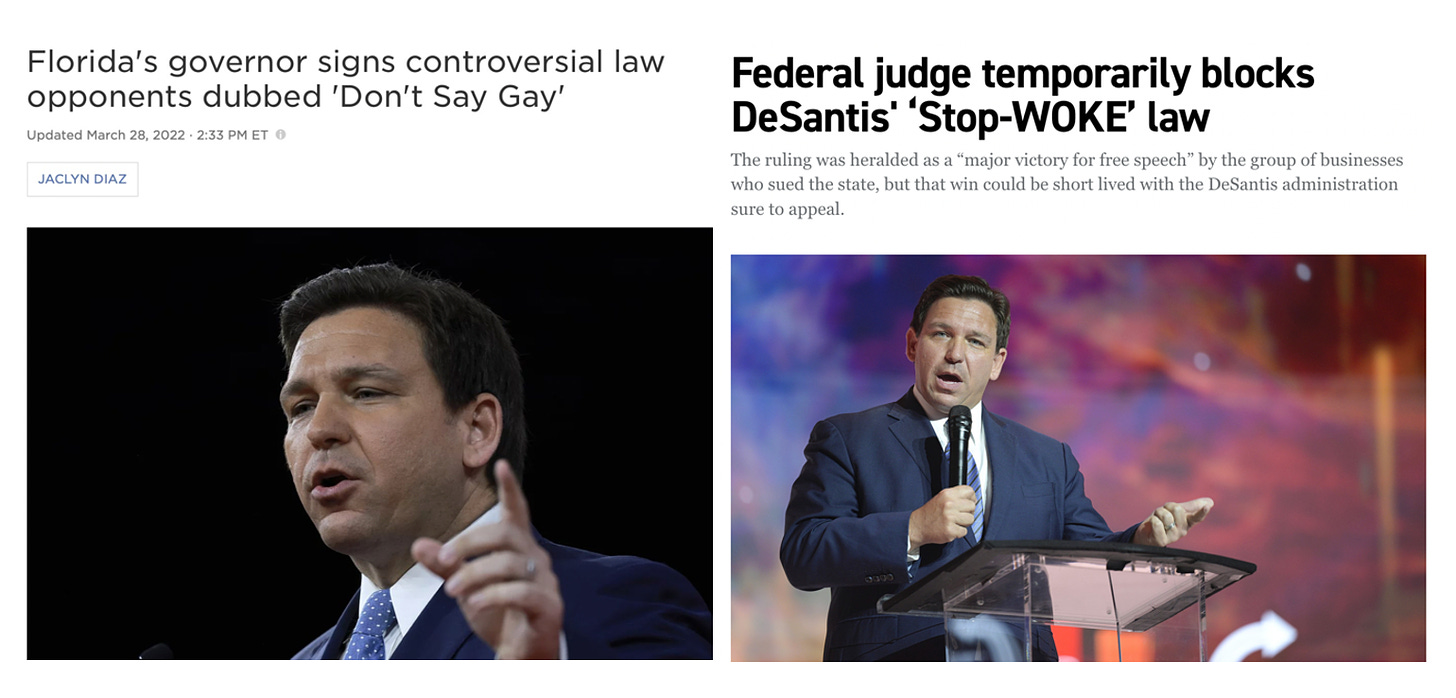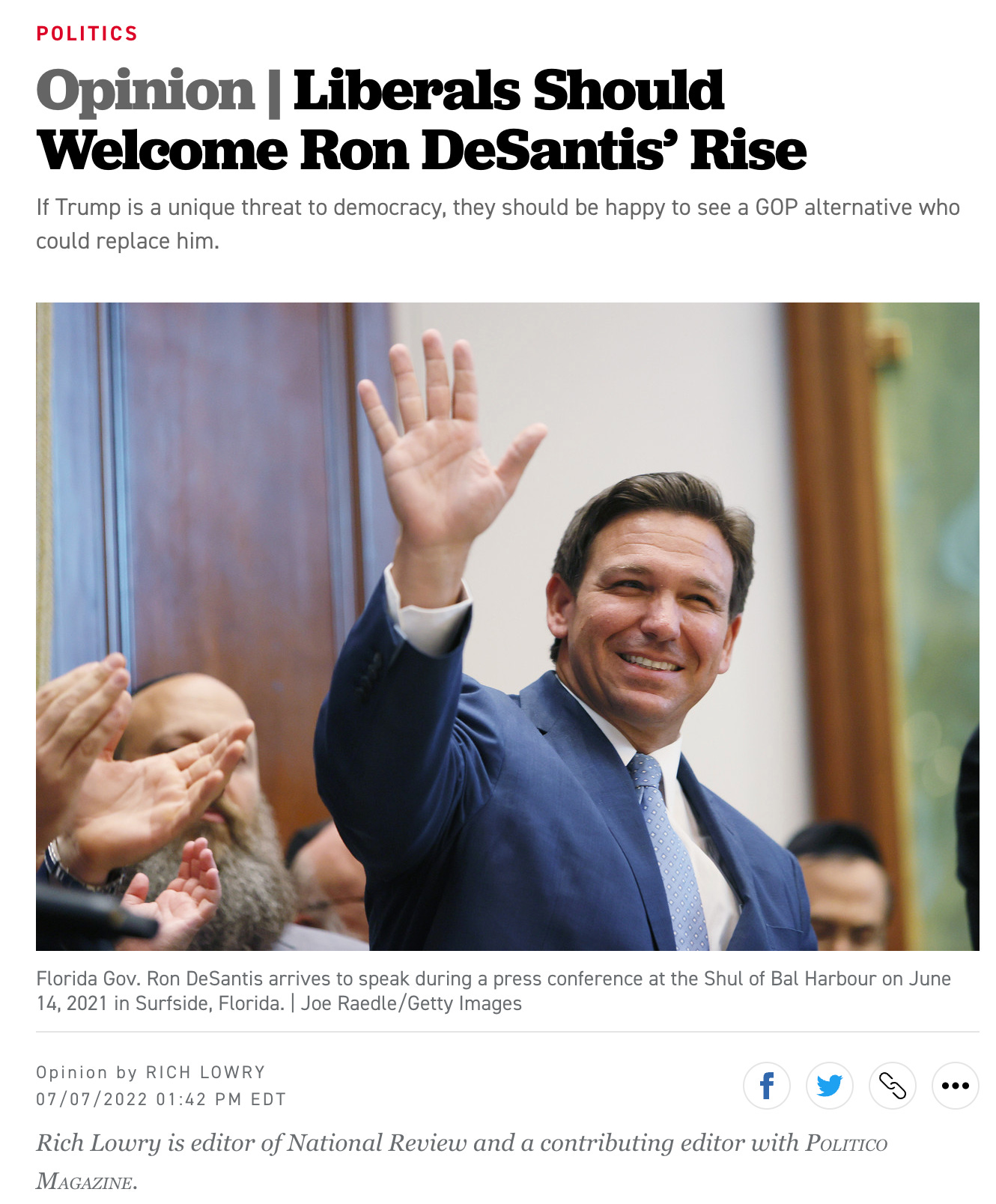In recent days President Biden has explicitly warned of the dangers to US democracy by “MAGA extremists” and “semi-fascism.” While Biden blames Trump for much of this, his message is that these tendencies now extend beyond Trump and have infected the Republican Party more broadly. Is this fair? One way to answer this question is to examine how the most likely non-Trump Republican President would operate.
It’s clear enough that someone like Larry Hogan is not going to be the next Republican presidential nominee. It will be Trump, or someone like Ron DeSantis. whose profile has been boosted by right-wing political media.1
This partly reflects a desire in venues like Fox to embrace a form of Trumpism without the headaches of Trump himself. DeSantis has modeled himself on Trump — the culture war tropes, hand gestures, the bullying tone and insults2 — but offers a loyal party Republican without the legal and ethical baggage of the former President.
Deciphering DeSantism therefore means examining what the near future, post-Trump version of the Republican Party will look like.
Trump moved Republicans past the rubicon when it comes to abuse of governmental power. Now they have shown a willingness, DeSantis offers the promise of more competent execution.
Democratic backsliding is more than just elections
I started thinking about this issue after the New York Times columnist Tom Edsall asked me what living under democratic backsliding would feel like for most Americans. Would they even notice?
You can read Edsall’s column here. I was especially struck by the comments that Arturas Rozenas, a professor of political science at NYU., offered:
Successful democratic backsliding requires careful management of the backlash that can occur in response to it. This is the case everywhere, but it is particularly important in the United States, where democracy is fundamental to national identity. An optimal strategy for a government that attempts an authoritarian takeover would be to do so in a way that is not easily detectable…You take a small step, the consequences of which to democracy are ambiguous — change election laws, voter-registration rules, increase partisan control of the Civil Service or weaken the independence of the judiciary. Many of the changes will be too gradual to cause a reaction, but in aggregate they will confer enough advantage for the incumbent to make it impossible for the opposition to win.
DeSantis has already shown a willingness to undermine such mechanisms of power. As someone who studies public administration, I think about democratic backsliding as about more than just elections, but also about how government operates, how it uses its power, and the degree to which it is accountable to the public. Here, again, DeSantis has established his anti-democratic credentials. His is a record of culture war battles that are not just symbolic, but aggressively use state power to erode individual rights and freedoms, often in obviously unconstitutional ways. Local governments or businesses are prevented from deciding how to manage their employees or customers.
This is the record that has catapulted him to a position to challenge Trump. His record of substantive policy achievement is negligible by comparison. His willingness to use coercive state power in culture war domains is not remotely conservative, if we think of conservatism as support for small government and individual liberty. As state actors erode both public values — such as transparency, due process and accountability — and individual rights, governments become less democratic and more authoritarian. This is what endears him to conservative media elites and donors.
This is the future that the right wants.
The DeSantis record on free speech
When it comes to the most basic political rights, the DeSantis record is deeply illiberal. DeSantis has signed laws that restrict the right to protest, despite no real record of violent protest in Florida in the aftermath of the George Floyd murder, and expanded the ability of drivers to run over protestors.
The erosion of free speech can be seen most clearly at institutions DeSantis sees as threatening to his values. At Florida’s public universities, faculty operate under a political board made up of Republican appointees. Ten of the 13 board members had donated more than $1 million to the DeSantis PAC. Under these conditions, senior administrative officials have chosen to sacrifice campus speech and academic freedom, even as they are being replaced by DeSantis allies. Florida higher ed institutions have censored faculty, preventing some from testifying against the state about DeSantis policies on voting and the pandemic. DeSantis has passed bills that monitor the political ideology of faculty and students, with the promise of using public money to fix any perceived imbalance. Such bills have encouraged students to monitor and report on professors whose views are not acceptable, a practice akin to what happens in classrooms in China.
In both higher education and K-12 education, DeSantis has signed bills that limit discussions in the classroom. He has banned classroom books on the flimsiest of reasons, such as the inclusion of widely accepted pedagogies like socio-emotional learning.
Much of this campaign of censorship has been justified by an opposition to “woke” values, or more specifically, giving educational professionals discretion in how they talk about issues of race, power and gender identity. He has attacked LGBTQ groups, and his press spokesperson has labeled anyone that opposes their "Don't Say Gay" bill as "groomers" (“Ron loves her, because she says things that even he won’t say” said a Republican consultant).
To an unusual degree, DeSantis has shown a willingness to also punish private institutions for any expressions of public dissent. The highest profile example was to revoke tax benefits for Disney when it spoke out over his anti-LGBTQ laws. He has also blocked public money promised to the Tampa Bay Rays after they called for action in the wake of multiple mass shootings. Cruise ship operators and the Special Olympics faced similar threats for seeking to maintain vaccine mandates. This represents a special form of crony capitalism, where private companies are taught that support for the regime brings rewards, but disloyalty will be punished. As with the treatment of educators, it rests upon both a deep antipathy toward free speech, and a willingness to selectively use state power to support friends and punish enemies.
The DeSantis record on the right to vote
DeSantis boosters have pointed out that, unlike Trump, DeSantis has not been engaged in a coup. So the people who raised concerns about Trump’s anti-democratic tendencies should be willing to embrace DeSantis!
Ah, the soft bigotry of low expectations.
Lets set aside the fact that DeSantis refuses to acknowledge that Biden won the 2020 election, which, to be sure, is a slightly higher bar than actively participating in an attempted coup, but hardly the sign of someone who has much faith in American democracy.
The actual DeSantis record on voting rights and representation shows a deep disregard for the most basic political right that democracies depend upon.
The most glaring example is the treatment of former felons. After two-thirds of Florida voters chose to restore voting rights for former felons, DeSantis and the Florida legislature dramatically narrowed the scope of the referendum, by weaponizing administrative burdens and a de facto poll tax that disproportionately hurt Black citizens.3 As a result, 800,000 former felons would now have to pay off often unaffordable fines and fees. Little wonder that only 8% of those who were made eligible to reclaim their voting rights did so two years later, in time for the 2020 election.
Even if DeSantis insisted that former felons had to repay fines and fees before voting, the DeSantis administration failed to provide the most basic information to allow them to do so — what was owed, and to who. Instead, DeSantis invested state resources in stoking confusion, intimidation and fear. DeSantis recently went on a media blitz after 20 former felons were sent back to jail for voting. It seems clear that these citizens were not engaged in some conspiracy to engage in fraud: at least some genuinely believed that they were eligible to vote because public officials had told them that they were eligible when they approved their voter registration.
In addition to his shameful treatment of felons, DeSantis has done plenty to kneecap third parties seeking to help voters, and to increase the costs of voting. Under his leadership:
Voter registration drives now risk a $50,000 fine if they return forms late, and must inform voters they they might miss the deadline to file forms.
Voting rights groups have long delivered mail ballots for voters. This has become a felony.
New restrictions have been imposed on drop boxes for such ballots.
Providing food or water to those waiting in line to vote is illegal.
DeSantis has banned donors who have helped to provide support for election administration costs when the state falls short: for sure, there can be donor money for politicians, just not to encourage people to vote.
DeSantis swept aside a gerrymandered legislative map to tilt even more strongly to Republicans at the expense of eliminating two of four Congressional seats traditionally won by Black candidates.
Creeping authoritarianism at a federal level
None of this matters to your daily life if you don't want to protest, or hear about structural racism, or LGBTQ identities, or are not a former felon, or support DeSantis and Republicans. And this points to the fact that there will not be a single experience under conditions of democratic backsliding. For many, life would go on as normal. Some might barely notice it, or even welcome it, while some will be directly and adversely affected. Certain groups would be more vulnerable. This includes historically marginalized groups, who might find new restrictions on voting. Or members of the LGBTQ community who are treated as second class citizens. People who work in civic institutions, such as public employment, higher education and philanthropy, may feel compelled to keep silent.
It is easy to shake your head at this if you live in a blue state. That reflects the geographical dispersion of democratic backsliding. But a DeSantis or more disciplined Trump presidency will use federal power to also attack the values of blue state voters. Let’s take just a couple of examples.
One belief that Trump-era Republicanism has internalized is the idea that institutions are fundamentally corrupt and must be punished or put under conservative control. Such a belief would animate an authoritarian use of federal powers. For example, a President could challenge the tax exempt status of philanthropies or universities he viewed as antagonistic to his beliefs, as DeSantis did with Disney, but on a wider scale. JD Vance has proposed to do as much on a federal level. The tax audits of James Comey and Andrew McCabe raise the specter of a President using a weaponized IRS to target individuals.
Trump's executive order that banned DEI training extended not just to federal employees, but to contractors that could include universities. Federal funding to universities is an essential source of revenues for many institutions. Tying new conditions to that money could be used as a tool to threaten academic freedom and campus free speech.
In general then, democratic backsliding would have a clearly chilling effect, as individuals, companies, researchers, public servants, or donors who fear the consequences of taking up a cause that is at odds with the regime.
Government dysfunction as a long-term consequence
People in the institutions being targeted will not just be less likely to speak truth to power, or provide accountability to the public. To the extent such institutions depend upon democratic values to function, they will become degraded over time.
If you live in Florida, you might notice that teacher shortages are getting worse, meaning that your kid has unqualified teachers in their classroom. As a result, DeSantis has deputized military veterans to teach kids. This is a feature, not a bug, of prioritizing culture war politics if you don’t care about the quality of government. A former Republican colleague from Congress noted that: “There were governing conservatives and shutdown conservatives. Ron was a shutdown conservative.”
It is quite likely that both Trump and DeSantis would use the Schedule F executive order to purge public officials seen as disloyal to the regime. Large swathes of the federal workforce would have to assume they would be fired for doing or saying something that would displease political leaders. Combine that with the anti-statist rhetoric that has engulfed the Republican Party, and the public sector looks like a less attractive place to work. Over the last few years, specific groups of public officials — election officials, public health teachers, school teachers and library workers — have been subject to wild conspiracy theories and unfounded accusations, and given less professional autonomy to do their job. A shift to a more authoritarian state makes public employees more vulnerable, where their professional competence matters less than their loyalty to the dominant regime or a particular political ideology.
As public service becomes a less professional and secure work environment, it will struggle to attract competent people. This will hasten the erosion of administrative capacity. Over time, we would have less reason to trust the ability of government to perform basic tasks we have come to rely on, like providing for a safe work environment, clean air or water. Such changes might be imperceptible on a day-to-day basis, but over time will significantly undermine the quality of American life.
The courts won’t save us
If much of this sounds wildly unconstitutional, it is. Key parts of the DeSantis agenda, like that of Trump, have stalled in the courts.
If the DeSantis goal is to win elections via culture war battles, the unconstitutionality of your actions has some benefits, as it allows you to keep the issue in the public eye, and tell your voters that you are fighting corrupt institutions. But you can also feel confident that the Trump-created SCOTUS supermajority will be increasingly on your side. The last Supreme Court term has shown a more aggressive and partisan court, unmoored by stare decisis, and therefore a less reliable ally when their partisan interests and obligation to protect individual rights come in conflict. They have, thus far, shown little appetite to acknowledge democratic backsliding as a problem, most obviously by ignoring the issue of gerrymandering, while adopting legal theories that bestow more power to the President and protect him from legal accountability.
The courts won’t save us. A reprieve from a more authoritarian America depends on our increasingly fragile democracy.
Dexter Filkins in the New Yorker reported that: “e-mail traffic between Fox producers and DeSantis’s office, produced in response to a public-records request, revealed an unusually collaborative exchange. DeSantis’s aides could not only pitch stories, they could also shape the discussion…“We see him as the future of the party,” a booker named Karrah Kaplan wrote.”
DeSantis on Fauci: “Someone needs to grab that little elf and chuck him across the Potomac.” On Biden: “a doddering, quasi-senile President.”
It is hard to overstate how central Flordia is to the disenfranchisement of felons in America. As Victor Ray, Pam Herd and I note elsewhere: Florida’s felon disenfranchisement accounted for about one quarter of all disenfranchised felons in America, and traces its roots back to post-Reconstruction policies targeted at newly enfranchised Blacks. Given how racism has shaped the criminal justice system, such laws both disproportionately target Black Americans and meaningfully affect the composition of the electorate. Over 6.2% of the Black adult population in America have lost voting rights through such felon disenfranchisement laws, compared with 1.7% of others.






